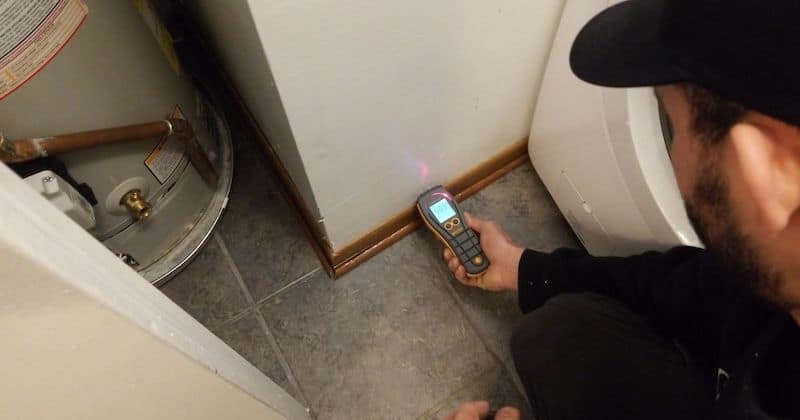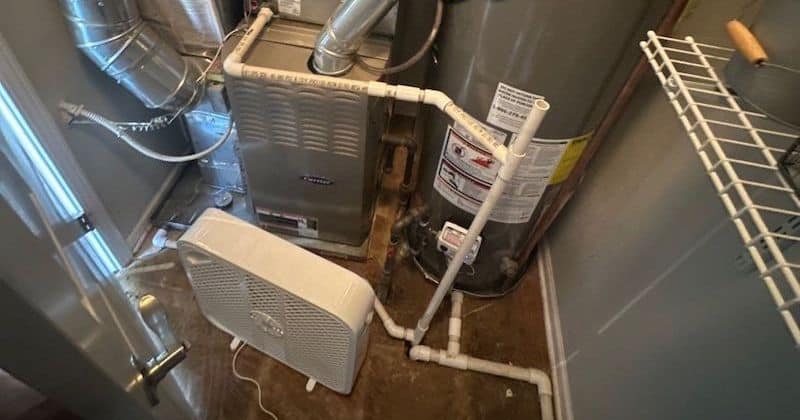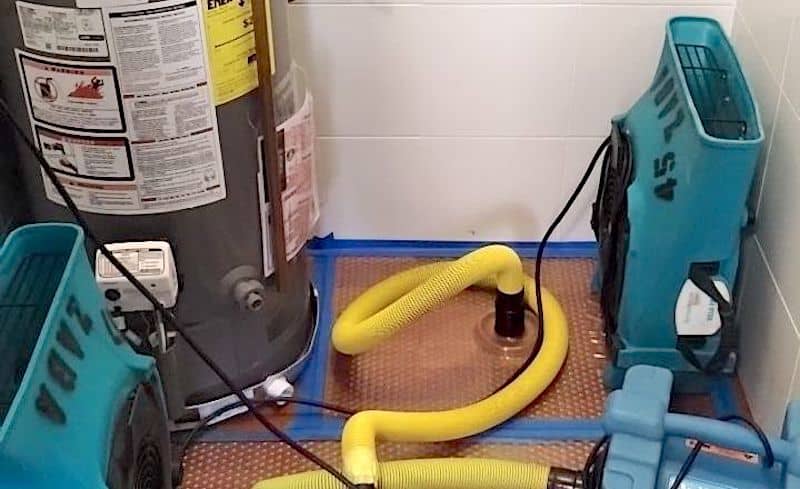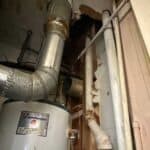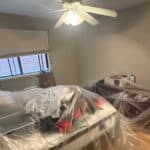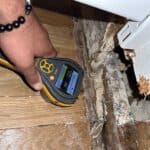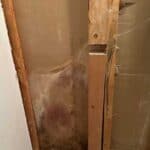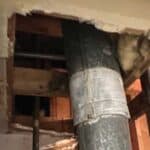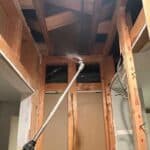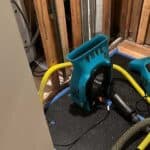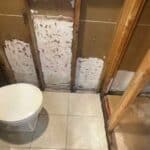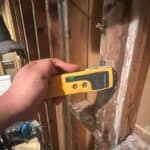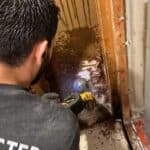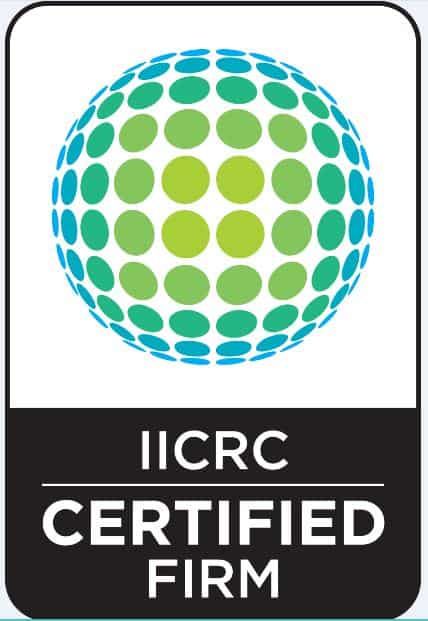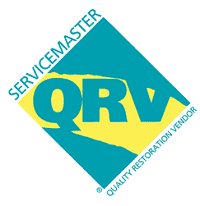A leaking or burst water heater can cause serious damage fast, often leading to soaked floors, damaged drywall, and the risk of mold if not addressed quickly.
At ServiceMaster of Lake Shore, we’re a trusted Chicago restoration provider with years of experience helping homeowners recover after flooding due to a defective water heater.
This quick guide walks you through the exact steps to stop the flooding, clean up safely, and prevent long-term water damage.
What to Do Immediately if Your Water Heater Floods
1. Turn Off the Power
Safety first. If your water heater is electric, go to your circuit breaker and shut off the power.
For gas-powered units, turn the gas control knob to the “Off” position. This prevents electrical shock or fire hazards during cleanup.
2. Stop the Water Flow
Turn off the cold water supply valve at the top of the heater by twisting it clockwise until fully closed.
If water keeps flowing or you can’t find the valve, shut off the main water supply to your home.
3. Clean Up Standing Water (If Safe)
Use towels, mops, or a wet/dry vacuum to remove as much water as possible.
Caution: If water is near electrical outlets or deep enough to pose a safety risk, call restoration professionals right away instead of attempting DIY cleanup.
4. Document the Damage and Contact Your Insurance
Before making repairs, take clear photos and videos of the affected area, including the water heater, surrounding floor, walls, and any belongings that were damaged.
This documentation is crucial if you plan to file a homeowner’s insurance claim.
Then, contact your insurance provider to report the incident and start the claims process.
Note: Restoration companies like ServiceMaster of Lake Shore can help by providing damage assessments, itemized repair estimates, and direct communication with your adjuster to support your claim and speed up approval.
5. Relieve Tank Pressure
Open a hot water faucet in your home to release internal pressure from the tank.
If your tank is leaking badly, attach a garden hose to the drain valve at the bottom and drain it into a floor drain or outside.
Caution: Make sure the cold water supply is off before draining.
6. Call a Licensed Plumber
Once the immediate danger is handled, contact a licensed plumber.
They’ll inspect the tank and determine whether it needs repair or full replacement.
7. Call ServiceMaster of Lake Shore for Water Damage Restoration
If your water heater has caused damage to floors, drywall, or surrounding areas, contact water damage restoration professionals such as ServiceMaster of Lake Shore.
We offer 24/7 water damage restoration throughout Chicago and the Suburbs.
Our team will dry, sanitize, and restore your space to prevent mold and further issues.
What Causes a Water Heater to Flood in Chicago Homes?
Corrosion from Sediment Buildup
Chicago’s hard water contains high levels of minerals that can settle at the bottom of the tank over time.
This sediment leads to rust, internal corrosion, and cracks, all of which can trigger leaks or tank failure.
Faulty Drain Valve
We’ve seen many cases in Chicago homes where a loose or defective drain valve slowly leaks unnoticed until it eventually fails and causes a major flood.
High Internal Pressure
If your water heater’s thermostat is set too high, typically above 120°F to 140°F, the water temperature can cause pressure inside the tank to rise.
When either pressure or temperature exceeds safe levels, the T&P (temperature and pressure) relief valve is designed to release water to prevent tank damage.
But if the valve fails or is overwhelmed, it can result in leaks or even a burst tank.
Old Age
Most standard water heaters wear out within 6 to 12 years. Aging parts are more likely to fail without warning.
Sewer Backup
During heavy rain, Chicago’s combined sewer and stormwater system can become overwhelmed, causing sewage to back up into basements.
This can flood the area around your water heater, damaging the tank or surrounding connections.
High Water Table
Chicago’s naturally high water table can lead to groundwater seeping through basement cracks, especially after storms or snowmelt.
Standing water around the heater can cause rust or internal damage over time.
Plumbing Leaks
Sometimes, it’s not the tank but the pipes. Leaks from supply lines or connections around the water heater can slowly saturate the area until a full flood occurs.
How to Prevent Future Flooding
Prevention is the best protection. Here’s how to reduce your risk of a flooded water heater:
- Schedule annual inspections: Have a licensed plumber check your water heater at least once a year for signs of wear, rust, or leaks.
- Flush the tank regularly: Sediment builds up over time. Flushing the tank helps prevent corrosion and keeps your system efficient.
- Install a drip pan and moisture alarm: A water heater catch pan can capture small leaks. Moisture alarms alert you before a small drip becomes a flood.
- Add shut-off valve protection: Automatic shut-off valves can detect leaks and stop the water supply before major damage happens.
- Install an anti-flood ring: These 4–5” high PVC rings are secured around the base of your water heater and help contain small floods, keeping water from spreading to floors and walls.
- Consider a tankless water heater: Tankless systems heat water on demand and don’t store gallons of water, which means no risk of a tank burst or flood.
- Install a backflow valve: Sewer backups can flood the area around your water heater, leading to rust, corrosion, or even system failure. Backflow preventers stop contaminated water from flowing back into your home during a sewer backup, especially important in flood-prone Chicago basements.
- Consider upgrading to an overhead sewer system: Basement flooding from sewer backups can damage water heaters and lead to costly repairs. Though more costly, overhead sewers can reroute wastewater above flood levels and dramatically reduce basement flooding risk.
- Stay informed on city infrastructure upgrades: Many Chicago neighborhoods experience flooding due to aging sewer systems, which can expose water heaters to standing water and cause rust or failure. Keep up with local improvement projects or neighborhood flood prevention programs.
Real Results: How We Restored a Lincoln Park Home After an Upstairs Water Heater Flood
In a Lincoln Park home, an upstairs water heater failure caused Category 3, Class 2 water damage across two bedrooms, a utility room, bathroom, and toilet room. Our team:
- Installed 1 dehumidifier, 6–8 air movers, and 1 air scrubber, completing the dry-out in just 4 days.
- Set up containment, floor protection, and surface sanitization in Bedroom 1.
- Handled the bedroom closet with content manipulation and full removal of two walls, the ceiling, and insulation before cleanup.
- In the utility room, we removed partial drywall from the ceiling and walls, followed by cleaning and sanitizing.
- Completed a 2-foot flood cut in the bathroom and removed one wall for drying.
- In the toilet room, we made a perimeter flood cut, removed wet insulation, and thoroughly cleaned the space.
Thanks to our fast response, we prevented further damage and restored the home quickly and safely.
Has a Water Heater Flood Damaged Your Chicago Home? We Can Help!
If your water heater caused serious water damage, DIY cleanup may not be enough.
At ServiceMaster of Lake Shore, we handle emergency flood damage restoration for Chicago and the suburbs, including Evanston, Glenview, Glencoe, Harwood Heights, and surrounding areas.
We will respond quickly, remove standing water, dry all affected areas, and sanitize and dehumidify your home to prevent mold and long-term damage.
Call us at (312) 707-8597 for fast, professional help.
FAQs
What are the warning signs of a water heater leak?
Watch for these signs that your water heater may be leaking or at risk of flooding:
- Dripping or leaking valves
- Rust streaks on the outside of the tank
- Fluctuating water temperatures or pressure
- Unusual noises like banging, clanking, or hissing
- Water pooling around the base of the unit
Does a flood ruin a water heater?
If your water heater was exposed to flooding, it should be replaced.
If the affected heater was a gas unit, flood waters could cause the valves and controls to corrode.
If it was an eclectic unit, water exposure will ruin the thermostat and controls, rendering the unit unsafe to use.
Does homeowners insurance cover flooding from a hot water heater?
Yes, most policies cover sudden and accidental water damage from a leaking or burst water heater.
However, they usually don’t cover damage from neglect or old age, and won’t pay to replace the heater itself.
Be sure to document the damage and contact your insurer promptly.


